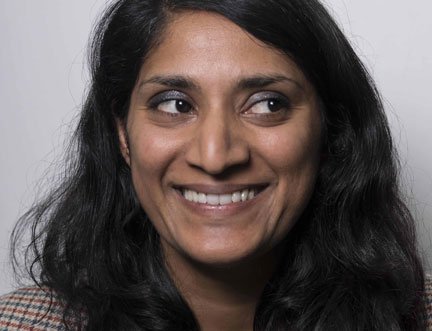More articles Wednesday 24 August 2016 5:45pm
Mapping the Myths and Metaphors of Pregnancy and Vaccination

Few experiences are as romanticised as pregnancy and early motherhood – or as shrouded in mystery. If bookshops offer up plenty in the way of medical volumes, instruction manuals and feminist analyses of all that is lost to a woman when she becomes a mother, books that deal intelligently with the multi-faceted emotional and intellectual undertaking of pregnancy are oddly thin on the ground.
Chitra Ramaswamy sought to confront this lack with her book Expecting, which charts the nine months of her pregnancy through nine essays. Her approach was, she told the Book Festival today, “like nature writing, but the pregnant body would stand in for the landscape. The pregnancy would be like a hike – a journey of the mind; a change of perspective as much as a change in the body.” The movement, she would go on to discover, was not only in a forwardly direction: a pregnant woman becomes engaged with her own past as well as with her own and her baby’s future. “In some ways it’s an ascent with childbirth at the apex, but at the same time it’s this weird circling through time. It’s future, past and present all at the same time.”
Changes in the body also fuelled the creation of On Immunity by Eula Biss. After the challenging birth of her son, Biss was preoccupied with protecting him from further risk, and thus found herself fearful of having him vaccinated. Elements of her peer group affected her thinking. “I was surrounded by parents who were frightened of vaccination,” she said. “There were things that scared them more than infectious diseases.” Further research led Biss to the understanding that “our bodies are continuous – we’re not as separated from our skin as we’ve always been told. One of the most pressing reasons to vaccinate is to protect other people from disease, not yourself.” Vaccination became, she said, a matter of community – and a distillation of “the fundamental issues of parenthood. How do you care for someone who can’t care for themselves?”
She found enlightenment in thinking of vaccination not as “fighting” or “battling” disease – those overused martial metaphors – but of education. “Childhood is a time of very rapid education for the body,” she said. “Immunisation is tutoring the body about disease.” The resistance to vaccination currently prevalent in her native United States flies in the face of “a very unusual amount of medical agreement” in its favour. “There’s unanimity, which is quite rare. Doctors think of it much differently than laypeople do, because they have an understanding of the immune system.” Passing through the birth canal, she pointed out, exposes a baby to far more bacteria than any vaccination.
The idea of birth as a dangerous, even a polluting process flies in the face of cute evocations of storks and teddy bears, but ties in with Ramaswamy’s complex and often darkly funny take on pregnancy. Both writers refer in their books to Gothic fiction, Biss finding kinship with Dracula – with its metaphors of infection and contagion – and Ramaswamy with that emotionally charged creation myth Frankenstein.
Mary Shelley, Ramaswamy noted, was pregnant through the writing of Frankenstein; had lost the baby by the time she finished it; and lost another by the time of its publication. She was also herself the product of a birth that killed her mother, Mary Wollstonecraft. Usually invoked as an allegory for reckless scientific overachievement, the resulting book is also, Ramaswamy said, “about the dark, painful, hysterical side of making a person. It was nine months of revelatory experience – and it wasn’t all positive. Sometimes it was very frightening, and isolating.” And some of the knowledge it brings, it’s just hard to know what to do with. “I still don’t know what a tilted uterus is. But I’ve got one.”

 Major new partnership with Celtic Connections
Major new partnership with Celtic Connections 

